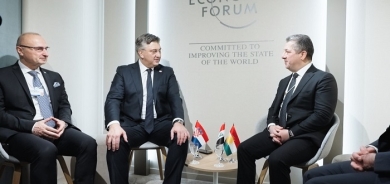Caught in the Middle: Syria’s Kurdish Population—and the U.S.

With the intensification of the fighting, Syria’s Kurds are finding it increasingly difficult to maintain a tightrope strategy that protects their own interests but avoids involvement in the conflict between government troops and the insurgents. A January 22 article in the New York Times asserted a growing number of Kurds have joined the rebel forces trying to overthrow Bashar al-Assad. The Times reporter contended that “hundreds” of Kurdish fighters were already aligned with the insurgent Free Syrian Army. But that is hardly a significant figure, given the tens of thousands of Kurds of fighting age living in the northeast. Moreover, on the very day the Times story appeared, Reuters reported that bloody clashes between Kurdish militias and rebel fighters over the previous week had killed at least 56 people. Insurgent forces even used tanks and mortars against their Kurdish adversaries.
Syria’s Kurdish population has no reason to love Assad. The government in Damascus committed numerous acts of oppression and outright brutality against Kurdish communities during his rule and that of his father. But Sunni Arabs, strongly backed by both Saudi Arabia and Turkey, dominate the insurgency. Assad, in turn, receives most of his domestic backing from his Alawite faction along with some support from Christians and Druze. All of those groups worry about the imposition of a Sunni Arab tyranny if the insurgents win.
Neither side offers much appeal to Syrian Kurds. The Assad regime is a known element that has proven itself less than friendly to Kurdish interests. However, the Free Syrian Army may be even worse. Not only are Islamist elements (including foreign fighters that have infiltrated Syria) increasingly prominent in the FSA, but Riyadh and Ankara’s enthusiastic backing of the rebellion understandably makes Kurds nervous. Saudi Arabia has never been a friend of Kurds anywhere, and Turkey has been an outright adversary. The emergence of a new Sunni Arab-dominated regime, beholden to Riyadh and Ankara, would clearly not be in the best interests of the more secular-oriented, and autonomy-seeking, Kurdish community.
Washington and its NATO allies are caught in a bind about the implications of the Syrian civil war on the Kurdish population. The Western powers clearly want to see Assad overthrown. Not only has he been a thuggish ruler, but he is Iran’s principal ally, and the NATO powers seek to further weaken and isolate Tehran.
However, U.S. policy makers also are nervous about the Islamist penetration of the insurgent movement. And the more perceptive members of the policy community in the United States realize that the Kurdish people, whether in Iraq, Syria, or Turkey, are among the most pro-Western (and especially pro-American) populations in the entire Middle East. If they experience brutality and devastation at the hands of the U.S.-backed FSA, Washington is going to find itself in a very awkward position.
Since it appears that the tightrope strategy of Syria’s Kurds is becoming increasingly difficult to maintain, the Obama administration may have to make a difficult decision in the next few months. It can continue to support the insurgents that now receive the bulk of their assistance from Washington’s NATO ally, Turkey. But such a course may lead to a new Syrian government that not only is unfriendly to U.S. interests, but oppresses the pro-Western Kurdish community. A second option is to back the Syrian Kurdish population’s aspirations for autonomy, but that move would infuriate Ankara (and Riyadh), thereby jeopardizing the support of those governments for other U.S. policy objectives in the Middle East. The final option would be to adopt a posture of strict neutrality, but Washington is already so deeply entangled in Syria’s internal conflict that a posture of neutrality would be difficult to revive and implement. In any case, pressure on the United States to deal with the status of the Kurdish community will mount as the security situation in Syria deteriorates.
Ted Galen Carpenter, a senior fellow at the Cato Institute, is the author of nine books and more than 500 articles and studies on international affairs. He is also a member of the editorial board of Mediterranean Quarterly.

 Ted Galen Carpenter
Ted Galen Carpenter











